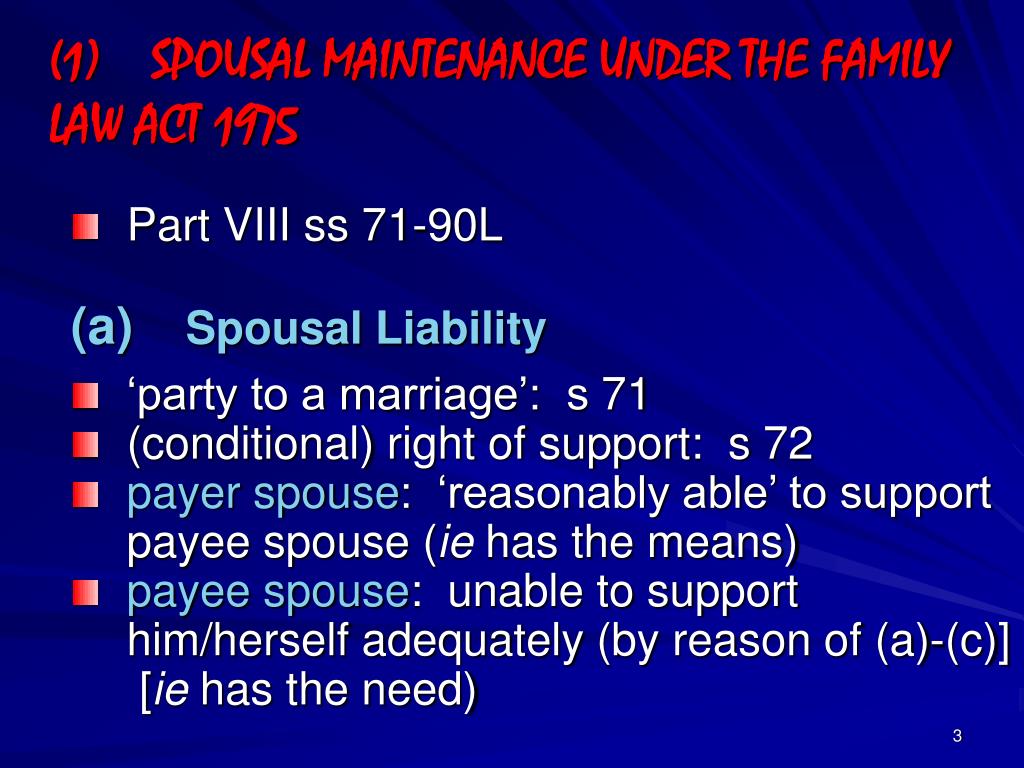
PPT FAMILY LAW TOPIC 7 PowerPoint Presentation, free download ID5826410
Snapshot. Since the High Court's 2008 decision in Kennon v Spry, the courts have been cautious in seeking to extend the concept of 'property' within the meaning of Family Law Act 1975 s 79 - particularly in the context of characterising the bare equitable rights of a spouse as beneficiary under a discretionary trust.; The 2022 decision of Woodcock v Woodcock (No 2) expanded the scope.
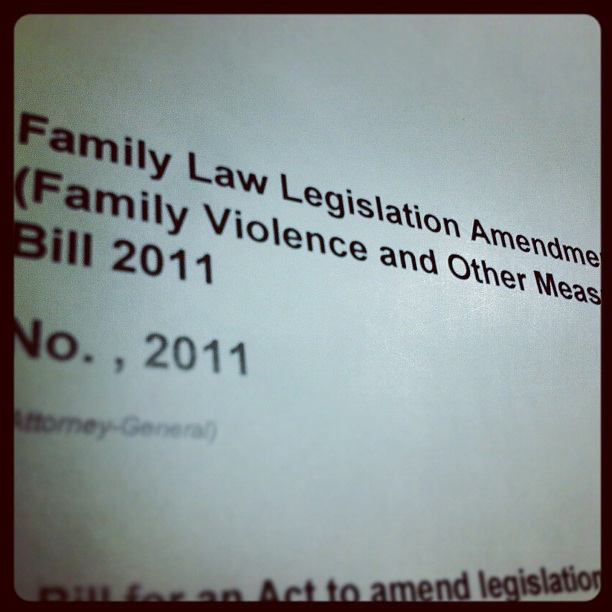
Amendments to the Family Law Act 1975 (Cth) Midlas
Act No. 53 of 1975 as amended, taking into account amendments up to Statute Law Amendment (Prescribed Forms and Other Updates) Act 2023: An Act relating to Marriage and to Divorce and Matrimonial Causes and, in relation thereto and otherwise, Parental Responsibility for Children, and to financial matters arising out of the breakdown of de facto relationships and to certain other Matters

Islamic Family Law Act 1984, Hobbies & Toys, Books & Magazines, Textbooks on Carousell
The Family Law Act. The court has the power to re-distribute matrimonial property between the parties to a marriage. This power is set out in s 79 (1) of the Family Law Act ("FLA"). Section s 79 (2) of the Family Law Act limits the use of this power to circumstances where making such order is "just and equitable.".

Family Law Act Sir John Walsh of Brannagh YouTube
FAMILY LAW ACT 1975 - SECT 90XS Order under section 79 or 90SM may include orders in relation to superannuation interests (1) In proceedings under section 79 or 90SM with respect to the property of spouses, the court may, in accordance with this Division, also make orders in relation to superannuation interests of the spouses.. Note 1: Although the orders are made in accordance with this.

PPT Actuarial Evidence for Dummies and Pension Actuaries Presentation at the Annual General
If you require legal advice in respect of your relationship and your legal obligations and rights under the Family Law Act please contact Hansons Lawyers on 42 222 666 or by email at [email protected]. April 29th, 2021. The Family Court has the power to order the alteration of interest in property based on an assessment of parties.

Children and the Family Law Act
Role of independent children's lawyer 68M. Order that child be made available for examination Division 11--Family violence 68N. Purposes of this Division 68P. Obligations of court making an order or granting an injunction under this Act that is inconsistent with an existing family violence order 68Q.
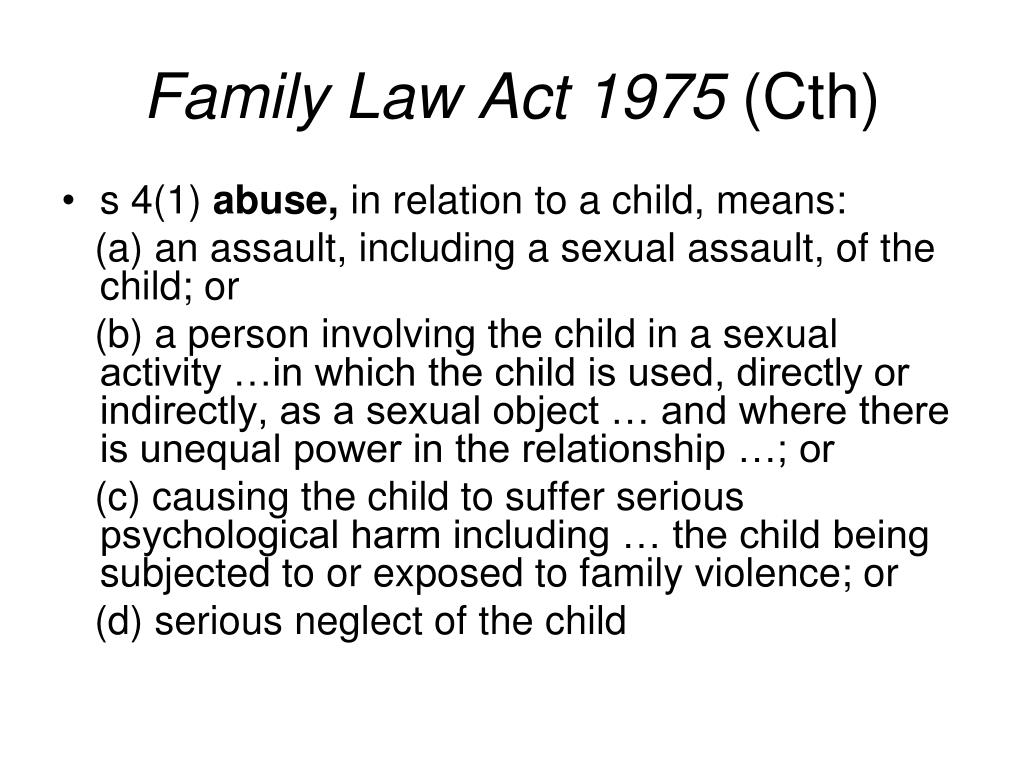
PPT FAMILY VIOLENCE AND CHILD ABUSE UNDER AUSTRALIA’S FAMILY LAW ACT 1975 (Cth) PowerPoint
FAMILY LAW ACT 1975 - SECT 79B. Notification of proceeds of crime orders etc. (1) If: (a) a person makes an application for an order, under this Part, with respect to: (i) the property of the parties to a marriage or either of them; or. (ii) the maintenance of a party to a marriage; and. (b) the person knows that the property of the parties to.
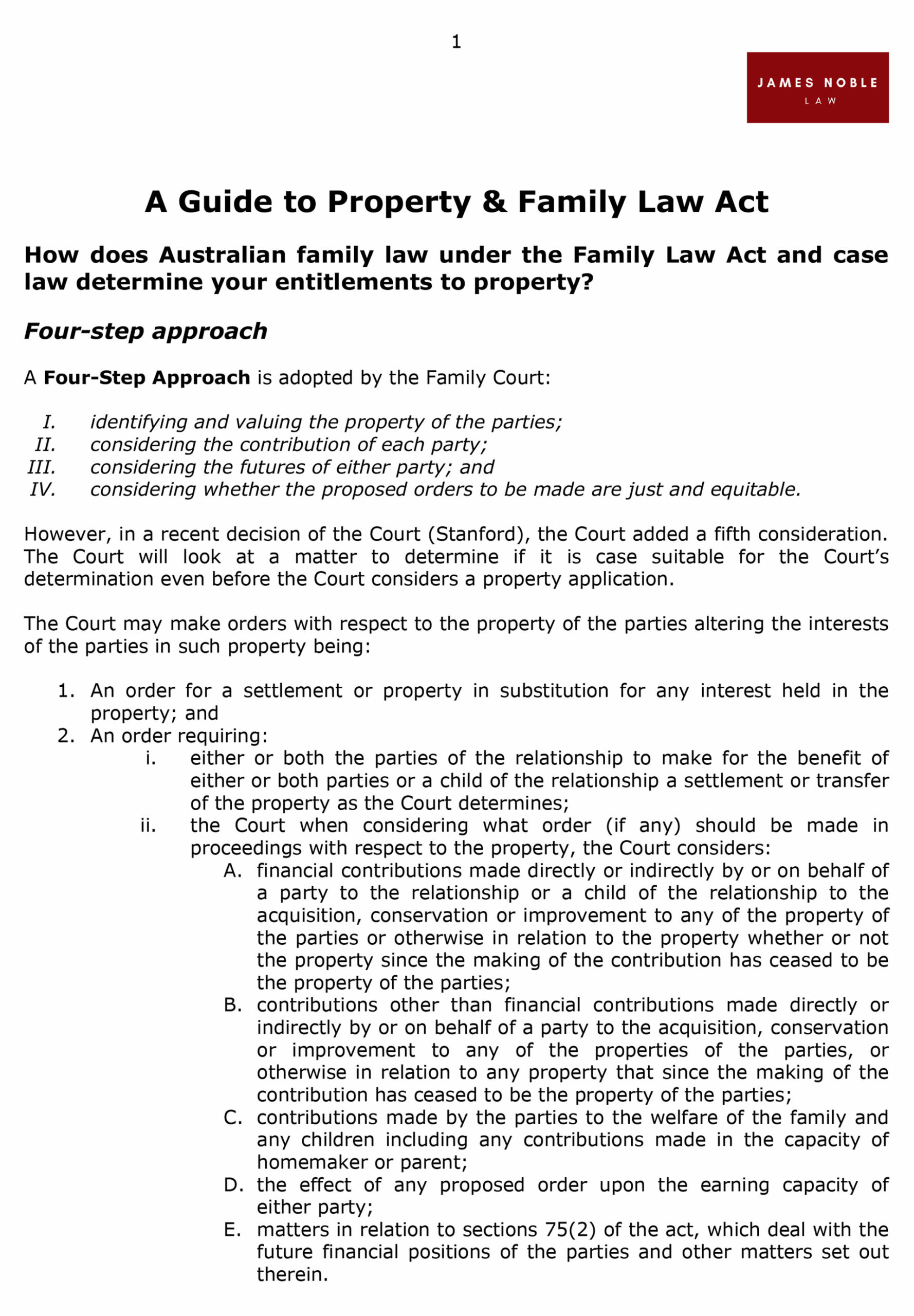
A Guide to Property & Family Law Act Paper Download James Noble Law
Family Law Act 1975. We acknowledge the traditional owners and custodians of country throughout Australia and acknowledge their continuing connection to land, waters and community.

Family Law Act 1975 Family law, Acting, Family
Pursuant to section 79 of the Family Law Act 1975 the Court may make Orders with respect to the property of parties to a marriage altering their interests in such property.. The Family Law Act 1975 defines property in relation to a marriage or de facto relationship, as property to which both parties or either party is entitled to, whether in possession or reversion.

Paternity Determination Under PA Law
FAMILY LAW ACT 1975 No. 53 of 1975 - SECT 79 Alteration of property interests. 79. (1) In proceedings with respect to the property of the parties to a marriage or either of them, the court may make such order as it thinks fit altering the interests of the parties in the property, including an order for a settlement of property in substitution for any interest in the property and including an.

1. FAMILY LAW ACT 1975 SECT 79A Setting aside of orders altering property interests Family
Commonwealth Consolidated Acts. FAMILY LAW ACT 1975 - SECT 79. (1) In property settlement proceedings, the court may make such order as it considers appropriate: (a) in the case of proceedings with respect to the property of the parties to the marriage or either of them--altering the interests of the parties to the marriage in the property; or.

Bonus content! Family law legislation explained YouTube
Level 2 535 Bourke Street Melbourne 3000 Victoria Australia. Telephone 61 3 9248 5800. Email [email protected]

Proposed Change to Ontario’s Family Law Act affecting Adult Children with Disabilities Devry
About this compilation This compilation This is a compilation of the Family Law Act 1975 that shows the text of the law as amended and in force on 9 December 2017 (the compilation date). The notes at the end of this compilation (the endnotes) include information about amending laws and the amendment history of provisions of the compiled
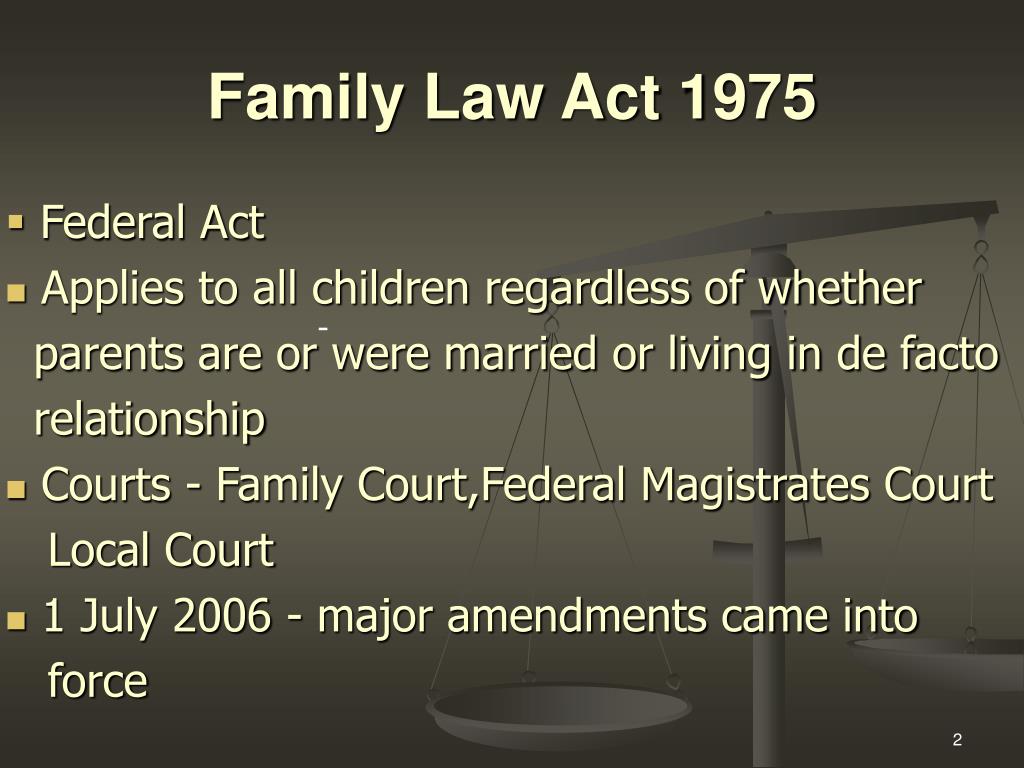
PPT Family Lawthe new changes PowerPoint Presentation, free download ID6638711
View latest version. C2018C00362 (C85) 01 September 2018 - 25 October 2018. View document. Table of contents. Volume 1. Volume 2.

Child Custody Types, Laws & Parental Rights Forbes Advisor
Section 79 (4) of the Family Law Act requires the court to consider several factors when it alters property interests. They include: Financial contributions made by each party to the marriage or relationship. Financial contributions made on behalf of each party to the relationship (for example, property provided by a relative).

FAMILY LAW ACT 1975 Family law, Acting, Law
FAMILY LAW ACT 1975 - SECT 79C Court to stay property or spousal maintenance proceedings affected by proceeds of crime orders etc. (1) A court in which property settlement or spousal maintenance proceedings are pending must stay those proceedings if notified under section 79B in relation to the proceedings. (1A) The court may, before staying proceedings under subsection (1), invite or require.
- Birds Of Paradise In Australia
- Hoppers Crossing Post Office Opening Hours
- Boeing 737 800 Virgin Seat Map
- Do Blue Banded Bees Make Honey
- Glow Stick Liquid In Eye
- The Adler A Hollywood Hotel
- Armstrong Green Units For Sale
- Gold Coast Private Hospital Address
- 250 British Pounds To Dollars
- Gypsy Rose Child Of The Year
